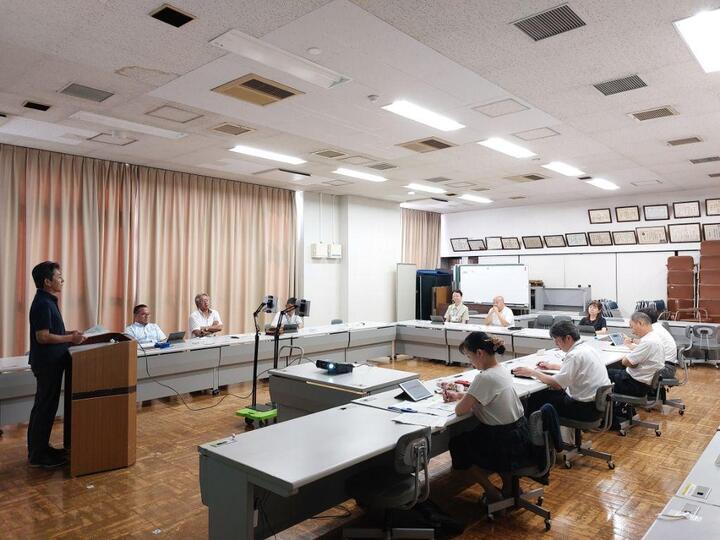No.3 Learning from each other From this summer training session
Update date: October 18, 2023
(Published in the October 15, 2020 issue of Lifelong Learning Newsletter “Hiroba”)
From this summer's training session, we will learn from each other.
In late August, the Board of Education held a two-day "school management training session." This is a training session held every year at this time for principals and vice principals of Inagi City Schools with the aim of improving school management. Up until last year, the event had been held in the form of a lecture by inviting education experts, but this year's event is planned to have principals introduce and discuss their own school management plans and strategies. I tried to. The intention of this naming is not to talk about a "battle" with something, but rather to "look back on one's own school management strategies," and to "reflect on one's own school management strategies." I wanted people to discuss this question more broadly.
On the day of the training session, principals from all 18 schools were divided into two groups, and on each day, nine principals gave presentations on their own school management strategies, followed by discussions and exchange of opinions. Ta. Additionally, vice principals participated online at their schools.
Each of the 18 principals demonstrated their well-devised and wonderful "strategies." I attended all the school presentations and discussions, and was impressed and impressed by each principal's understanding and analysis of the current situation at their school, as well as the "strategies" backed by their respective experiences, careers, and educational views. However, I would like to share with you the following three points that were particularly impressive.
First, all principals, with big hearts and warm eyes, keep in mind that each child can spend their days comfortably and happily, and that they can feel the results of their learning and their own growth and spend their time with motivation. We have confirmed once again that various efforts are being made.
The second point is that all principals are working as a "team" to build the school, with the same thoughts as the teachers, parents, local community, and children. . To this end, they were working on various strategies such as ``easy-to-understand communication'', ``independent goal setting by faculty and staff,'' ``utilization of school organizations,'' and ``formation of projects and teams among faculty and staff.''
The third point is what I felt as a result of this training session. Opinions from principals during discussions after the presentations included, ``I'm glad we were able to discuss ideas beyond elementary and junior high school types,'' ``I received a lot of hints for school management,'' and ``It made me reflect on my own strategies.'' By listening to people who have the same goal and sharing their "strategies" with each other, they were able to realize perspectives that they could not have seen on their own and expand the range of their thoughts and ways of looking at things. I thought so. Looking back, I think that the idea behind planning such a training session came about when I recently entered graduate school and learned from colleagues who had the same goals as me. I was greatly inspired by the experience, and was able to broaden my horizons while reflecting on my own thinking tendencies. I wanted to achieve this kind of learning with the principals as well. In addition, at the beginning of this school year, during our annual ``initial visit'' to each school, we asked each principal about their plans for this year, and we felt that this was valuable information for the principals to share with each other. There was also a background in which I became convinced that there was.
There is also another thought that I have always had regarding this matter. A few years ago, a long-time acquaintance who is active at the top of a company wrote in a corporate magazine, ``The keywords ``independent, interactive, and deep learning'' are emerging in schools, so I think corporate education should also be based on this. I came across an article that suggested that it would be better to create compatibility. "Independent, interactive, and deep learning" is a concept that is positioned as an important perspective for improving classes in the current curriculum guidelines. ``Independent learning'' by oneself, ``collaborative learning'' in which one's ideas are broadened and deepened through collaboration and dialogue with peers, and ``collaborative learning'' in which students deepen their understanding, form ideas, and come up with solutions. Over time, the school's principals have suggested that "deep learning" and this way of learning are meaningful even after entering the workforce as adults. He came back from the dead.
This summer's learning sessions with principals taught us that ``independent, interactive, and deep learning'' is a meaningful way of learning for both children and adults, as well as for top school leaders. It was a valuable opportunity to reacquaint ourselves with this. It was also a moment when I realized once again the fun and value of thinking, learning from each other, sharing and exchanging thoughts, and further expanding and deepening one's own thinking.
Makiko Sugimoto, Superintendent of Inagi City Board of Education
Quote: Yukihiro Hosoya, “What kind of education do newcomers receive during their student days?” (Companies and Human Resources, March 2020 issue, Sanro Research Institute)

School management training session
Inquiries regarding this page
Inagi City Education Department Educational General Affairs Division
2111 Higashinagumanuma, Inagi City, Tokyo
Phone: 042-378-2111 Fax: 042-379-3600







